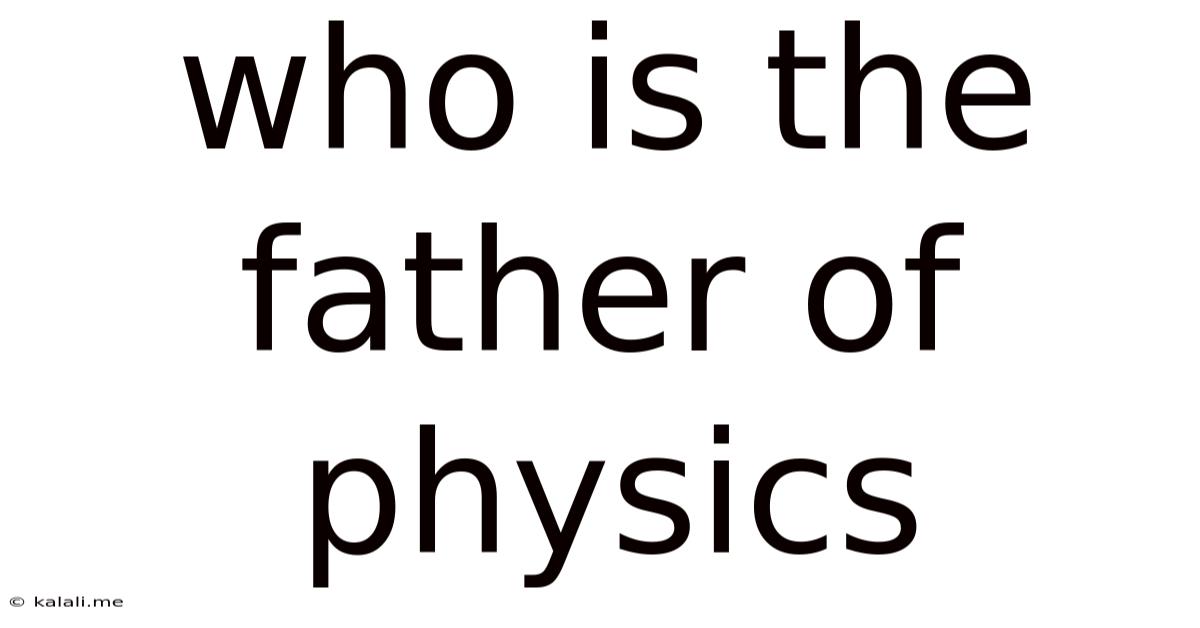Who Is The Father Of Physics
Kalali
Jun 11, 2025 · 2 min read

Table of Contents
Who is the Father of Physics? A Look at the Pioneers
The title "Father of Physics" is a complex one, not easily attributed to a single individual. Physics, as we understand it today, is the culmination of centuries of observation, experimentation, and theoretical breakthroughs. While no single person invented physics, several key figures laid the groundwork for its development, making the question more nuanced than a simple answer. This article explores the contributions of several prominent figures and why pinning down a single "father" is inaccurate and misleading.
A Multifaceted Legacy: Why There's No Single "Father"
The quest to understand the universe and its workings began long before the formal discipline of physics existed. Ancient Greeks like Aristotle made significant contributions to understanding motion and the natural world, forming a base upon which future scientific thought would build. However, their approaches often lacked the rigorous experimentation that characterizes modern physics. Later, figures like Galileo Galilei revolutionized the field through his meticulous observations and experiments, challenging established Aristotelian views and paving the way for a more empirical approach.
This brings us to Isaac Newton, arguably the most frequently cited candidate for the title. His laws of motion and universal gravitation, detailed in his Principia Mathematica, provided a unifying framework for understanding a vast range of physical phenomena. Newton's work marked a watershed moment, transforming physics from a collection of disparate observations into a more coherent and predictive science. His impact on the development of classical mechanics is undeniable.
But Newton's work wouldn't be the complete picture without acknowledging Albert Einstein. Einstein's theories of relativity, both special and general, revolutionized our understanding of space, time, gravity, and the universe's large-scale structure. His work challenged Newton's laws at the extremes of speed and gravity, extending our understanding far beyond the classical framework.
Beyond the Leading Names: A Collective Effort
Beyond these giants, countless other scientists, mathematicians, and philosophers contributed to the development of physics. Consider the contributions of:
- Archimedes: Whose work on buoyancy and levers laid fundamental groundwork for mechanics.
- Johannes Kepler: Who formulated the laws of planetary motion.
- James Clerk Maxwell: Who unified electricity, magnetism, and light through his equations.
- Marie Curie: Whose groundbreaking work on radioactivity opened up new fields of physics.
Conclusion: A Legacy of Collaboration
Therefore, the question of who is the "father of physics" is ultimately unanswerable in a simple way. Physics' rich history is a testament to the collective efforts of numerous brilliant minds across centuries and cultures. While Newton and Einstein stand out as transformative figures, attributing the title of "father" to one individual diminishes the remarkable contributions of others who paved the way for their breakthroughs and shaped the field into what it is today. The journey to understanding the universe is an ongoing collaborative endeavor, built upon the shoulders of giants, both famous and unsung.
Latest Posts
Latest Posts
-
How Many Bottles Is 64 Oz Of Water
Jul 02, 2025
-
How Many Ounces In Pound Of Meat
Jul 02, 2025
-
What Is The Diameter Of A Quarter
Jul 02, 2025
-
Spoon Gets Hot In A Bowl Of Soup
Jul 02, 2025
-
How Many Cups In A 16 Oz Sour Cream
Jul 02, 2025
Related Post
Thank you for visiting our website which covers about Who Is The Father Of Physics . We hope the information provided has been useful to you. Feel free to contact us if you have any questions or need further assistance. See you next time and don't miss to bookmark.